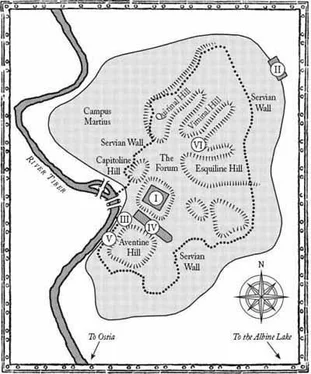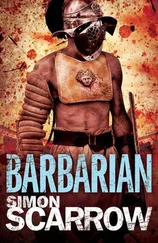Simon Scarrow - Praetorian
Здесь есть возможность читать онлайн «Simon Scarrow - Praetorian» весь текст электронной книги совершенно бесплатно (целиком полную версию без сокращений). В некоторых случаях можно слушать аудио, скачать через торрент в формате fb2 и присутствует краткое содержание. Жанр: Исторические приключения, на английском языке. Описание произведения, (предисловие) а так же отзывы посетителей доступны на портале библиотеки ЛибКат.
- Название:Praetorian
- Автор:
- Жанр:
- Год:неизвестен
- ISBN:нет данных
- Рейтинг книги:4 / 5. Голосов: 1
-
Избранное:Добавить в избранное
- Отзывы:
-
Ваша оценка:
- 80
- 1
- 2
- 3
- 4
- 5
Praetorian: краткое содержание, описание и аннотация
Предлагаем к чтению аннотацию, описание, краткое содержание или предисловие (зависит от того, что написал сам автор книги «Praetorian»). Если вы не нашли необходимую информацию о книге — напишите в комментариях, мы постараемся отыскать её.
Praetorian — читать онлайн бесплатно полную книгу (весь текст) целиком
Ниже представлен текст книги, разбитый по страницам. Система сохранения места последней прочитанной страницы, позволяет с удобством читать онлайн бесплатно книгу «Praetorian», без необходимости каждый раз заново искать на чём Вы остановились. Поставьте закладку, и сможете в любой момент перейти на страницу, на которой закончили чтение.
Интервал:
Закладка:
Simon Scarrow
Praetorian
CHARACTERS
In the Praetorian Guard
Tribune Balbus – in charge of the bullion convoy
Centurion Gaius Sinius – an ambitious back-stabber
Tribune Burrus – commander of the Third Cohort of Praetorians
Centurion Lurco – practically part-time commander of the Sixth Century of the Third Cohort
Optio Tigellinus – Lurco’s frustrated subordinate Guardsman Fuscius – a recent recruit who thinks he’s a veteran
Prefect Geta – commander of the Praetorian Guard
At the Imperial Palace
Emperor Claudius – a fair ruler, though not always a coherent one
Empress Agrippina – his wife and niece, and mother of Prince
Nero – a pleasant boy with artistic ambitions
Prince Britannicus – the son of Claudius, clever but cold
Narcissus – imperial secretary and close adviser to Claudius Pallas – another close adviser to the Emperor and Empress
Septimus – an agent of Narcissus
In Rome
Cestius – a vicious and ruthless leader of a crime gang Vitellius – playboy son of a senator, and long-standing enemy of Macro and Cato Julia Sempronia – the lovely daughter of Senator Sempronius


The Imperial Palace Complex

The Praetorian Camp

The Boarium

The Great Circus

The Warehouse District

The Subura Slum District
CHAPTER ONE
The small convoy of covered wagons had been on the road for ten days when it crossed the frontier into the province of Cisalpine Gaul. The first snows had already fallen in the mountains to the north that towered above the route, their peaks gleaming brilliantly against the blue sky. The early winter had been kind to the men marching with the convoy and though the air was cold and crisp, there had been no rain since they had left the imperial mint in Narbonesis. A bitter frost had left the ground hard and easy going for the wheels of the heavily laden wagons.
The Praetorian tribune in command of the convoy was riding a short distance ahead and as the route crested a hill he turned his horse aside and reined in. Ahead the road stretched out in a long straight line, rippling over the landscape. The tribune had a clear view of the town of Picenum a few miles away where he was due to meet the mounted escort sent from the Praetorian Guard in Rome – the elite body of soldiers tasked with protecting Emperor Claudius and his family. The century of auxiliary troops that had escorted the four wagons on the road from Narbonensis would then march back to their barracks at the mint, leaving the Praetorians, under the command of the tribune, to protect the small convoy for the rest of the journey to the capital.
Tribune Balbus turned in his saddle to survey the convoy marching up the slope behind him. The auxiliaries were Germans, recruited from the tribe of the Cherusci, large, fierce-looking warriors with unkempt beards thrusting out between the cheek-guards of their helmets. Balbus had ordered them to keep their helmets on as they passed through the hills, as a precaution against any ambushes from the bands of brigands that preyed on unwary travellers. There was little chance that the brigands would risk an attack on the convoy, Balbus knew well enough. The real reason for his order was to cover up as much of the auxiliaries’ barbaric hair as possible to avoid alarming any civilians they passed. Much as he appreciated that the German auxiliaries could be trusted with guarding the mint, owing their loyalty directly to the Emperor, Balbus felt a very Roman contempt for these men recruited from the wild tribes beyond the Rhine.
‘Barbarians,’ he muttered to himself, with a shake of his head. He was used to the spit and polish of the Praetorian cohorts and had resented being ordered to Gaul to take charge of the latest shipment of silver coin from the imperial mint. After so many years of service as a guardsman, Balbus had very fixed ideas of how a soldier should appear and if he had been posted to a cohort of German auxiliaries, the very first thing he would have done would be to order them to shave off those wretched beards and look like proper soldiers.
Besides, he was missing the comforts of Rome.
Tribune Balbus was typical of his rank. He had joined the Praetorians and served in Rome, working his way up through the ranks, before taking a transfer to the Thirteenth Legion on the Danube and serving as a centurion for several more years and then applying to return to the Praetorian Guard. A few more years of steady service had led to his present appointment as tribune, in command of one of the nine cohorts of the Emperor’s personal bodyguard. In a few more years Balbus would retire with a handsome gratuity and take up an administrative post in some town in Italia. He had already set his sights on Pompeii where his younger brother owned a private bathhouse and gymnasium. The town was on the coast with fine views of the bay of Neapolis and had a decent set of theatres as well as a fine arena, surrounded by taverns selling cheap wine. There was even the prospect of an occasional brawl with men from the neighbouring town of Nuceria, he mused wistfully.
Behind the first five sections of auxiliaries came the four wagons, heavy vehicles drawn by ten mules each. A soldier sat on the bench beside each of the drivers and behind them stretched the goatskin covers, tightly tied over the locked chests resting on the beds of the wagons. There were five chests in each wagon, each containing one hundred thousand freshly minted denarii – two million in all, enough to pay an entire legion for a year.
Balbus could not help a moment of brief speculation about what he could do with such a fortune. Then he dismissed the whimsy. He was a soldier. He had given his oath to protect and obey the Emperor. His duty was to see that the wagons reached the treasury in Rome. Balbus’s lips tightened as he recalled that some of his fellow Praetorians had a somewhat more flexible understanding of the concept of duty.
It was less than ten years ago that members of the Praetorian Guard had murdered the previous Emperor and his family. True, Gaius Caligula had been a raving madman and tyrant, but an oath was as solemn a commitment as Balbus could think of. He still disapproved of the removal of Caligula, even though the new Emperor chosen by the Praetorians had proved to be a rather better ruler. The accession of Claudius had been a confused affair, Balbus recalled. Those officers who had murdered his predecessor had intended to return power to the Roman senate. However, once the rest of their comrades realised that no emperor meant no Praetorian Guard, with all the privileges that went with the job, they swiftly cast around for a successor to the throne, and came up with Claudius. Infirm and stammering, he was hardly the ideal figurehead for the greatest empire in the known world, but he had proved himself a generally fair and effective ruler, Balbus conceded.
His gaze shifted to the last five sections of the German auxiliaries marching behind the wagons. While they might not look like proper soldiers, Balbus knew that they were good in a fight, and their reputation was such that only the most foolhardy of brigands would dare to attack the convoy. Anyway, the danger, such as it was, had passed as the convoy descended on to the broad flat valley of the River Po.
Читать дальшеИнтервал:
Закладка:
Похожие книги на «Praetorian»
Представляем Вашему вниманию похожие книги на «Praetorian» списком для выбора. Мы отобрали схожую по названию и смыслу литературу в надежде предоставить читателям больше вариантов отыскать новые, интересные, ещё непрочитанные произведения.
Обсуждение, отзывы о книге «Praetorian» и просто собственные мнения читателей. Оставьте ваши комментарии, напишите, что Вы думаете о произведении, его смысле или главных героях. Укажите что конкретно понравилось, а что нет, и почему Вы так считаете.












